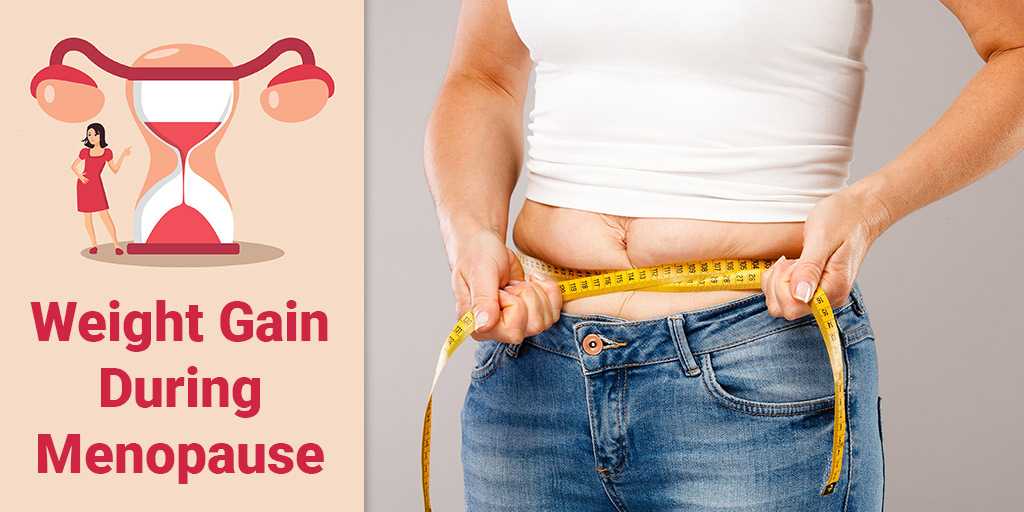
Just like during the start of menstruation, a woman undergoes major bodily changes during menopause. Among the changes, is the drop in the level of estrogen, the female reproductive hormone. Irregular periods, hot flashes, mood swings, sleep disturbances are some of the things she experiences. Another phenomenon is weight gain, especially around the abdomen. Many women struggle through this while approaching or undergoing menopause. Excessive weight gain for any reason is bad as it increases your risk of a host of health issues, such as cardiovascular diseases, high blood pressure, type-2 diabetes, etc. Hence, it must be prevented. But, how? A recent study has shown that the key to preventing menopausal weight gain might lie in perimenopause, which is the period proceeding to menopause.
Table of Content:-
Reason(s) For Menopausal Weight Gain
Before going through the study and its findings, let us know the chief reasons for weight gain during menopause.
- Estrogen: As you approach menopause, your estrogen levels dip. As per animal studies, a lack of estrogen leads to the build-up of abdominal fat. However, the mechanism is currently unknown.
- Loss Of Muscle Mass: As you age, you lose muscle mass that can restrict physical activity, causing weight gain.
- Lifestyle: Poor diet, lack of physical activity, stress, and lack of enough sleep can also contribute to weight gain.
Also read: Why Do Some Women Experience Early Menopause? Symptoms, Treatment, Prevention Tips
Study On Menopausal Weight Gain

(Photo Credit: Unsplash)
The study entitled ‘Metabolic effects of menopause: a cross-sectional characterisation of body composition and exercise metabolism’ was published in the journal ‘Menopause’ of The North American Menopause Society (NAMS). For this, researchers evaluated women across stages, such as premenopause, perimenopause, and postmenopause.
- Premenopause: During this phase, you experience no symptoms associated with perimenopause and menopause. You menstruate, whether regularly or not, and undergo slight hormonal changes.
- Perimenopause: It is the phase right before menopause during which you experience the symptoms associated with menopause.
- Postmenopause: When you do not menstruate for 12 months straight, it is called postmenopause.
The study was aimed at understanding the changes in resting and exercise metabolism with respect to body composition. Finding a relation between body composition and several lifestyle indicators, such as nutrition, physical activity, and sleep, was another aim.
- The researchers found that perimenopausal women had an elevated percentage of fat. The greatest changes in body fat occurred between the pre and perimenopause phases.
- They had low lean body mass, and there was a significant shift towards central obesity. Hence, they concluded that perimenopause is an opportune window to prevent weight loss associated with menopause.
- Also, postmenopausal women had the poorest metabolic flexibility.
Also read: Can Menopause Result in Depression?
How To Manage Menopausal Weight Gain?
Perimenopause can be a good time to prevent menopausal weight gain. Here are some tips that might help:
- Eat Healthily: A balanced, nutritious meal can keep you healthy and your weight in check.
- Exercise: Physical activity is another pillar of good health and healthy weight. Hence, dedicate enough time for workouts regularly.
- Build Muscle Mass: With advancing age, one can experience a loss of muscle mass, which, in turn, can cause weight gain. Hence, to build them, including strength and weight training in your exercise routine.
Weight gain during menopause is what many women complain of. It can turn out to be a big problem if not tackled early on. Hence, while approaching menopause, build a healthy lifestyle based on good food, lots of exercises, and enough sleep.
Photo Credit: WomanLog, MenoMe
Also watch this video
How we keep this article up to date:
We work with experts and keep a close eye on the latest in health and wellness. Whenever there is a new research or helpful information, we update our articles with accurate and useful advice.
Current Version